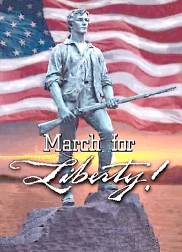

Our Enemy, The State by Albert J. Nock
The Classic Critique Distinguishing 'Government' from 'STATE'
United States Constitution Amendments
Article II of the Bill of Rights
June 26, 2008 -- Court Record Syllabus -- PDF File
It is well to remember the words of James Madison as we search for truth in government and understanding in this Amendment.
"Do not separate text from historical background. If you do, you will have perverted and subverted the Constitution, which can only end in a distorted, bastardized form of illegitimate government."
A well regulated Militia being necessary to the security of a free State, the Right of the People to keep and bear Arms shall not be infringed.
The operative words in this Article are "the Right of the People to keep and bear Arms SHALL NOT be infringed."
Let it be borne in mind that ALL of the first ten Articles of Amendment are of national effect, are declaratory and restrictive, superceding all contravening portions of the National and State constitutions..
Any and all laws, rules, regulations, proclamations, etc., Pro or Con, which may be entered in the record, addressing these freedoms are UNCONSTITUTIONAL and therefore NULLITIES.
Each phrase of this succinct statement of purpose and restriction upon the Congress and upon the Federal Government is re-stated below with definition and explanation of its sources and its application.
Most Americans today believe that the National Guard is the Militia reserved to the states in the State Constitutions and the Constitution of the United States of America. Nothing could be further from the TRUTH.
The National Guard did not exist from the beginnings of the Republic until 1903 when it was instituted and created by Congress as the Act of January 21 , 1903, known by the name of its sponsor as "The Dick Act".
In 1982 the Senate Judiciary Committee Sub-committee on the Constitution stated in Senate Document 2807:
"That the National Guard is not the 'Militia' referred to in the Second Amendment is even clearer today. Congress had organized the National Guard under its power to 'raise and support armies' and not its power to 'Provide for organizing, arming and disciplining the militia.' The modern National Guard was specifically intended to avoid status as the constitutional militia, a distinction recognized by 10 U.S.C. 311(a).
Title 32 U.S.C. in July 1918 completely altered the definition of the militia and its service, who controls it and what it is. The difference between the National Guard and Regular Army was swept away, and became a personnel pay folder classification only, thus nationalizing the entire National Guard into the Regular Standing Armies of the United States."
All the arms, munitions, armament and equipment of the National Guard is owned and controlled by the federal government, not by "the people" as clearly stipulated in the last phrase of the Second Amendment.
The Unorganized Militia consists of all able bodied persons of the nation and of the states between the ages of 17 and 44, and is exclusive of all members of the organized militia, i.e., the Armed Forces of the Federal Government of the United States and of the National Guards of the various states of the Union.
Title 10 U.S.C. 311. Militia: composition and classes
(a) The militia of the United States consists of all able-bodied males at least 17 years of age and, except as provided in section 313 of title 32, under 45 years of age who are, or who have made a declaration of intention to become, citizens of the United States and of female citizens of the United States who are members of the National Guard.
(b) The classes of the militia are -
(1) the organized militia, which consists of the National Guard and the Naval Militia; and
(2) the unorganized militia, which consists of the members of the militia who are not members of the National Guard or the Naval Militia.
In the Colonial Declaration of Rights of October 19, 1765 it was complained that Kings had disarmed the people. Of course the colonists were by force of early circumstances bearers of arms. This prohibition upon the Nation means that it can never interfere with the people who make the militia of the States; and that therefore the States will always have the means to check by physical force any usurpation of authority not given to the Nation by the Constitution.
shall not be infringed"
This right already existed. Maryland and Virginia had such provisions in their constitutions when the Constitutional Convention sat, as do all States at this time. These are prohibitions binding upon the States to preclude infringement of this right of the people by each of the individual States.
The Founders of our Nation and the Framers of the Constitution were well aware of the dangers of the tyranny and treason of a run-away governmental bureaucracy and had a very PRIMARY reason for the inclusion of the Second Amendment to the Constitution. Let's let them speak for themselves:
"Firearms stand next in importance to the Constitution itself. They are the American people's liberty teeth and keystone under independence. From the hour the Pilgrims landed, to the present day, events occurences and tendencies prove that to ensure peace, security and happiness, the rifle and pistol are equally indispenable. The very atmosphere of firearms everywhere restrains evil interference - they deserve a place of honor with all that's good." -- George Washington, Commanding General of the Continental Army, Father of Our Country and First President of the United States in a speech to Congress, January 7, 1790
"The strongest reason for the people to retain the right to keep and bear arms is, as a last resort, to protect themselves against tyranny in Government." -- Thomas Jefferson, Author of The Declaration of Independence, and Third President of the United States
"Laws that forbid the carrying of arms ... disarm only those who are neither inclined nor determined to commit crimes. Such laws make things worse for the assaulted and better for the assailants, they serve rather to encourage than to prevent homicides, for an unarmed man may be attacked with greater confidence than an armed man." -- Thomas Jefferson
"The highest number to which a standing army can be carried in any country does not exceed one hundredth part of the souls, or one twenty-fifth part of the number able to bear arms. This portion would not yield, in the United States, an army of more than twenty-five or thirty thousand men. To these would be opposed a militia amounting to near half a million citizens with arms in their hands, officered by men chosen from among themselves, fighting for their common liberties and united and conducted by governments possessing their affections and confidence. It may well be doubted whether a militia thus circumstanced could ever be conquered by such a proportion of regular troops. Besides the advantage of being armed, it forms a barrier against the enterprises of ambition, more insurmountable than any which a simple government of any form can admit of. The governments of Europe are afraid to trust the people with arms. If they did, the people would surely shake off the yoke of tyranny, as America did. Let us not insult the free and gallant citizens of America with the suspicion that they would be less able to defend the rights of which they would be in actual possession than the debased subjects of arbitrary power would be to rescue theirs from the hands of their oppressors. -- James Madison, principal author of the Constitution, principal writer of The Federalist Papers, Fourth President of the United States, Mainstream Revolutionary and Militant.
"What, Sir, is the use of a militia? It is to prevent the establishment of a standing army, the bane of liberty. . . .Whenever Governments mean to invade the rights and liberties of the people, they always attempt to destroy the militia, in order to raise an army upon their ruins." - Rep. Elbridge Gerry of Massachusetts, Signer of the Declaration of Independence, VP of the United States 1813-1814, spoken during floor debate over the Second Amendment, I Annals of Congress at 750, August 17, 1789
"It is not the function of the government to keep the citizen from falling into error; it is the function of the citizen to keep the government from falling into error." ---- U.S. Supreme Court Justice Robert H. Jackson
For a more complete discussion of the Second Amendment to the Constitution see "The Constitution of the United States, Its Sources and Its Application"
It is of great interest to note that in the ensuing years since this Amendment was ratified that commas have been inserted after the words "Militia" and "Arms", providing misconstruction of a very explicit restriction on the legislatures and the government. These commas appear in virtually all presentations of the 2nd Amendment today, including the official NARA presentation, and in no early publication that we have found to date. The correct wording as presented to the People of the States, and their conventions for ratification, and from which they could not deviate, is shown in this image of the "True Bill" and also in The Federalist On The New Constitution, 1796, Page 16 showing the first 4 amendments. See also the discussion of the first twelve Amendment proposals.
In June 1999, I finally found a current Government presentation of the Constitution, sponsored by the United States Senate on the United States Government Printing Office web site, the 2nd amendment right... without the extra commas after the words Militia and Arms.
The interpretation of the words "Well Regulated" at the time that the Amendment was written was in the context of a field piece ("the militia of able bodied citizens, organized or not, is the "field piece" of the American people"). A well regulated field piece is fully manned, armed and equipped, aimed, accurate and ready to defend the rights and freedoms of the citizens. So also the description of a timepiece, "accurate, not deviating, precise and to the moment, in present time."
The second clause is the bar against any and all Federal actions by any branch thereof... executive, legislative or judicial.
The Second Amendment Stands as the Guarantor of All other Rights and of the Defense of the Constitution itself.
![]()
Reproduction of all or any parts of the above text may be used for general information.
This HTML presentation is copyright by Barefoot, February, 1996
Mirroring is not Netiquette without the Express Permission of Barefoot.

Visit Barefoot's World and Educate Yo'Self
On the Web February 20, 1996Three mighty important things, Pardn'r, LOVE And PEACE and FREEDOM

